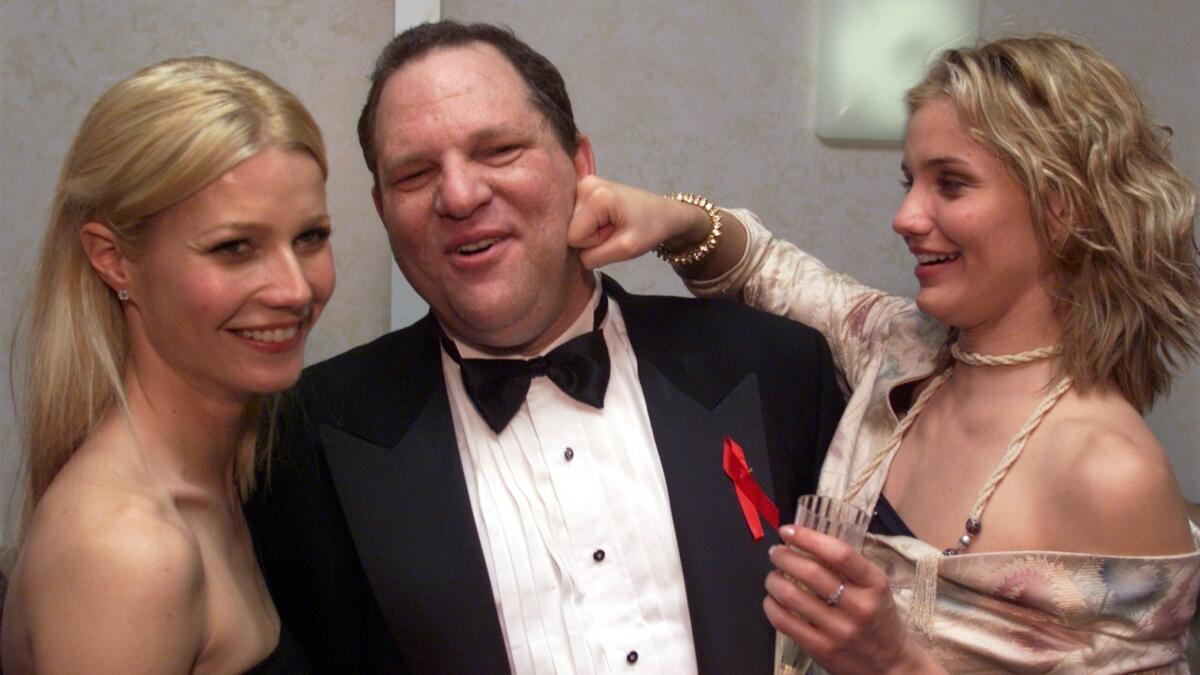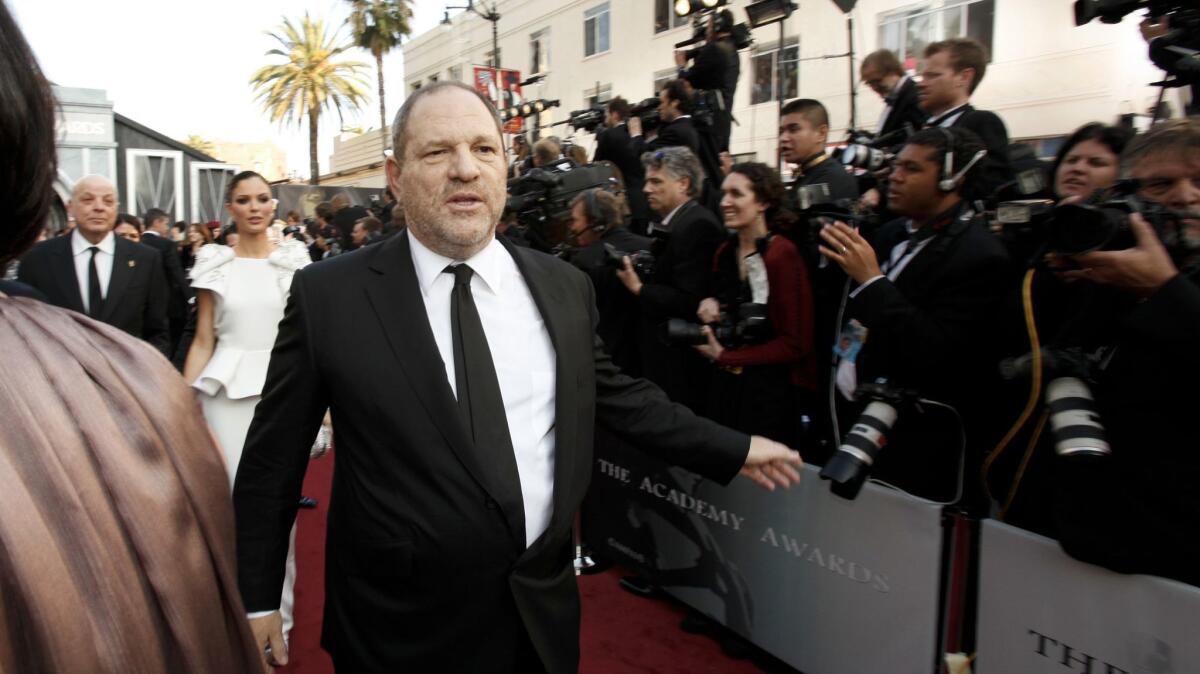Harvey Weinstein is finding that few in Hollywood want to be on his side

Weinstein was fired after a bombshell New York Times report published Oct. 8 detailed decades of sexual harassment accusations and settlements against the film producer.
Harvey Weinstein, the brash outsider from Queens who upended Hollywood, has always liked to think of himself as an underdog. So there may have been no prouder moment for him than the night of March 21, 1999, when he stood on the stage at the Academy Awards accepting the best picture Oscar for “Shakespeare in Love,” which had won in a stunning upset over Steven Spielberg’s “Saving Private Ryan.”
As his fellow producer Donna Gigliotti thanked him for “having the guts, the courage, the commitment to make this picture,” Weinstein beamed, soaking in the cheers from the crowd. He was at the peak of his power. Running Miramax with his brother Bob, he could turn art-house fare into mainstream hits, mint award nominations at an unprecedented clip and make or break careers. A 2015 survey of nearly 1,400 Oscar acceptance speeches by the website Vocativ found that Weinstein was thanked more frequently than God.
Yet some of the applause that night came from people who secretly — or not-so-secretly — rooted against him. Many in Hollywood felt the victory for “Shakespeare in Love” was as much a credit to Weinstein’s costly and bitterly fought Oscar campaign as to the film’s merits.
And some just found him generally loathsome. Weinstein was, and is, as famous for his temper as for his taste. He would regularly reduce people to tears with his blistering, belittling tantrums, unleashing torrents of profanity-laced verbal abuse — and the occasional ashtray or headlock — on whatever unlucky soul became the target of his wrath. His reputation for re-cutting directors’ movies was so firmly established, it earned him the nickname Harvey Scissorhands.
And, according to a bombshell report in the New York Times last week, he sexually harassed a series of women, including film stars and employees.
Even so, Weinstein reigned for years as one of the most powerful men in Hollywood, inspiring loyalty as well as fear as he changed the movie business in ways good and bad. With films such as “Pulp Fiction” he pumped up American independent cinema, while his all-out Oscar campaigns turned awards season into an often-nasty and increasingly expensive public brawl. Love him or hate him, he was a man you wanted on your side.
Now, in the wake of the New York Times report, which detailed decades of sexual harassment accusations and payouts, Weinstein is finding that few in Hollywood want to be on his side.

Weinstein’s influence had already begun to dim considerably in recent years. The Weinstein Co. has faced significant financial challenges, and new, deeper-pocketed competitors — including Amazon Studios, A24, Netflix and Fox Searchlight — have stolen the awards season spotlight.
As soon as the story broke last week, Weinstein issued a statement of apology, took a leave of absence from his company and then threatened to sue the New York Times. No one publicly came to his defense. Instead, some in Hollywood admitted they were unsurprised by the stories of Weinstein’s treatment of women, saying they had long been an open secret.
“The only thing I’m surprised about,” one former Miramax executive who worked closely with Weinstein told the Los Angeles Times, “is how long it took.”
Weinstein has long embodied both Hollywood’s highest aspirations and its worst impulses, which may explain in part why the allegations against him have had such deep reverberations throughout the industry. “If I didn’t exist, they’d have to invent me,” Weinstein once said. “I’m the only interesting thing around.”
::
From the outset of his career, Weinstein cultivated the persona of a Damon Runyon-esque hustler and relentless climber, an updated edition of an old-school studio mogul. He was a walking contradiction, by turns charming and bullying, his basest appetites — for food, cigarettes, combat and apparently sexual conquest — matched by his hunger for cinematic glory.
As then-Times columnist Patrick Goldstein wrote in 2007, Weinstein was “the crazy, spittle-spewing, chain-smoking hustler who would bellow insults, twist arms and shamelessly hype whatever movie was due that week.”
The man who turned little-known indie directors into rock stars — and, in the process, became one himself — began his career, fittingly enough, as a rock promoter. The Weinstein brothers were 20-something concert promoters when in 1979 they started Miramax Film Corp., naming the company after their parents, Miriam and Max. A passionate film lover, Weinstein liked to recount the story of how he had seen François Truffaut’s “The 400 Blows” at age 14 — thinking it at first to be a sex film — and had his life instantly changed.
In 1989, the Weinsteins shot to prominence when they bought the rights to release Steven Soderbergh’s “sex, lies, and videotape” not long after the film won the Audience Award at the Sundance Film Festival. The event was not just a seismic moment for Miramax, Soderbergh and Sundance; it set the stage for the commercial boom for independent film in the 1990s.
From there, Miramax — which the Weinsteins would sell to the Walt Disney Co. in 1993 but continue to operate — had a roller-coaster existence. Over the years, numerous other companies tried to replicate the Weinsteins’ formula combining awards victories and box-office success. But none could match Miramax’s record of 249 Oscar nominations and 60 wins in just 15 years or deliver crossover hits such as “The Crying Game,” “The Piano” and Quentin Tarantino’s “Pulp Fiction,” the first independent film to break $100 million at the box office.
There’s only one part of you that works — the ability to pick scripts and pick movies. Otherwise, you’re a complete disaster as a person.
— actor Daniel Day-Lewis, speaking to Harvey Weinstein
Indeed, Weinstein’s name came to be synonymous with the Oscars, so much so that in 2003, when he had a hand in four of the five best picture nominees, The Times wrote that the ceremony should be renamed “the Harveys.”
Over the years, Weinstein’s prowess as a producer, marketer and distributor would give countless actors and filmmakers a significant boost in their careers. “I love Harvey,” Judi Dench, who won a supporting actress Oscar for “Shakespeare in Love,” told The Times in an interview shortly before the harassment story broke. “I owe him for giving me my film career.”
But some who benefited from Weinstein’s golden touch were not as kind. Actor Daniel Day-Lewis, who won his first Oscar for 1990’s “My Left Foot,” told Weinstein, “There’s only one part of you that works — the ability to pick scripts and pick movies. Otherwise, you’re a complete disaster as a person.”
Tellingly, it was a quote Weinstein often repeated with pride.
That one part of Weinstein served him and his movies well. Over the years, three Miramax movies won best picture — “The English Patient,” “Shakespeare in Love” and “Chicago” — and after leaving Miramax and founding the Weinstein Co., the Weinsteins scored back-to-back best picture wins with “The King’s Speech” and “The Artist” in 2011 and 2012.
Weinstein is often credited with creating the modern Oscar campaign. He honed what studios had been doing for decades, throwing lavish parties to schmooze awards voters and carpet-bombing academy members with VHS screeners to ensure that his movies were not ignored. “What we did was democratize the process,” he told The Times in 2006.
Weinstein’s reputation as a master Oscar tactician reached its pinnacle with the 1999 win for “Shakespeare in Love.” As Weinstein slugged it out on the awards trail against the heavily favored “Saving Private Ryan,” Miramax and DreamWorks each spent at least $5 million on their campaigns and quite possibly much more, leading to a fair amount of bitterness.
“There is no question that the aggressiveness of the extraordinary campaign Miramax has run in support of ‘Shakespeare’ has caused us do more on behalf of ‘Ryan,’ ” DreamWorks executive Jeffrey Katzenberg complained to The Times.
In addition to the lavish expenditures, Weinstein came to be known — fairly or not — for igniting whisper campaigns against competitors. He famously mixed politics into his campaigns, having stars such as Day-Lewis and Bradley Cooper testify before Congress on issues related to their films and arranging a meeting for Steve Coogan and Philomena Lee with Pope Francis after a Vatican screening of “Philomena.”

In 2005, the Weinsteins left Miramax in a bitter split from Disney over spending and soon launched the Weinstein Co. But within a few years, as the market for independent films cratered, the company was foundering.
Successes such as “Silver Linings Playbook” and Tarantino’s “Django Unchained” were far outnumbered by flops, including the costly musical “Nine.” Numerous titles sat on the shelf for years, and some — such as “Grace of Monaco,” which premiered at Cannes — never received a U.S. theatrical release.
And Weinstein’s touch with Oscar fare hasn’t been as sure in recent years. As the motion picture academy’s membership broadened, the increasingly cash-strapped company has found itself losing ground.
Last year, the Weinstein Co. earned six Oscar nominations, including best picture, for the drama “Lion,” but this year’s slate is far less promising, with only the murder mystery “Wind River” as a long-shot hopeful.
Weinstein has fought his way out of tough corners before, always projecting an indomitable spirit. But over the years, as the power that once provided a shield to his bad behavior has waned, some believe a lifetime of karma has finally caught up with him.
Even as Weinstein copes with the fallout from the New York Times story and pledges to become a better person, reporters are digging with new fervor into his past in the belief that many women who may have feared speaking out in the past may now feel emboldened to do so.
Three members of the Weinstein’s Co.’s nine-member board of directors have resigned since the report was published. Four others, including Bob Weinstein, released a statement noting the board has ordered an independent investigation into the allegations. “We strongly endorse Harvey Weinstein’s already-announced decision to take an indefinite leave of absence from the Company,” the statement continued.
And on Saturday, Weinstein lost two key members of his legal team: attorney Lisa Bloom and crisis manager Lanny Davis.
Now the man who has always seemed to be spoiling for a fight has the biggest one of his life on his hands: a fight not for a gold statuette or box-office bragging rights, but for his own survival.
Times staff writer David Ng contributed to this report.
ALSO
Weinstein Co. orders investigation of Harvey Weinstein sexual harassment allegations
Senators start giving away money Harvey Weinstein donated to them
More to Read
Only good movies
Get the Indie Focus newsletter, Mark Olsen's weekly guide to the world of cinema.
You may occasionally receive promotional content from the Los Angeles Times.













